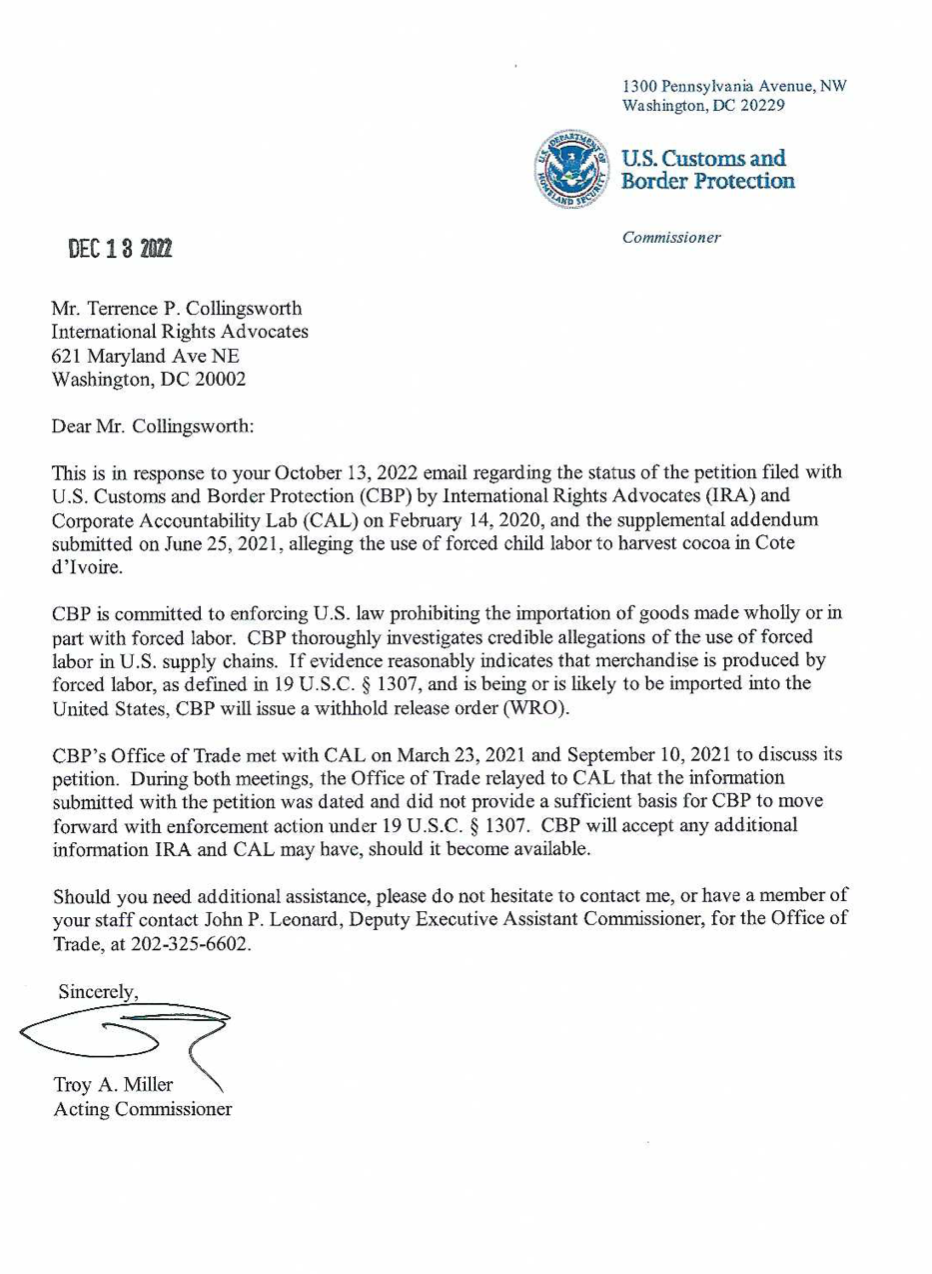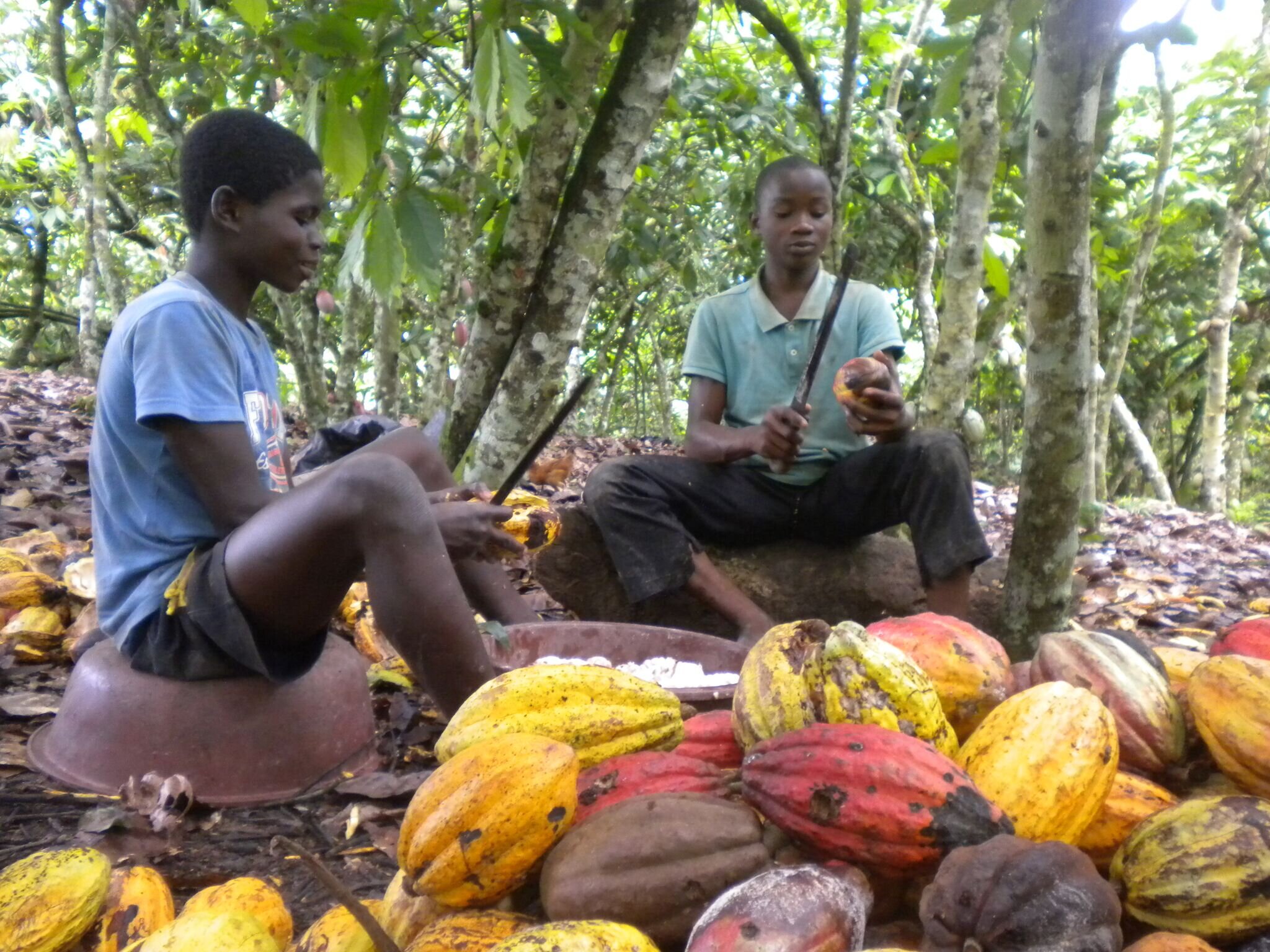SUSTAINABILITY INITIATIVES IN THE COCOA INDUSTRY by Bright Adjei Debrah
The sustainability issues in cocoa are multidimensional and complex. Farmers are getting older, and they tend to be on small farms with large families, they work on the farm with very little to no external paid labor and they don’t have very big harvests. They also have a dropping productivity rate and they have murky land tenure rights. That combination often leads to encroachment into protected lands and forests. Poverty also leads to children needing to contribute to the family income by working on the farms but often by engaging in illegal child labor. Illegal child labor means things like carrying really heavy loads, using dangerous materials like machetes, or using chemicals and they are missing school or not going to school at all.
The latest numbers we have are that more than 2 million children are engaged in illegal child labor on West African cocoa farms. Smallholder farmers also have very little say in the prices that are paid for cocoa, actually pretty much none because the government set the price of cocoa. The farmers are very dependent on their local bean collectors (purchasing clerks) for the timing of when they pass by the farm to collect the seeds. The price that they get paid for the cocoa beans is way too low to earn a living income.
If we as a society want real economically stable societies that are linked up to the global food chain, then that is something that needs to change. Earning a living income is a basic human right that has been agreed upon with the UN as one of the global sustainable development goals, and cocoa farmers are far from it because most West African cocoa farmers are under a dollar a day.
The manufacturing process is very fractured, and this fractured process leads to enmity, when what we really need in the cocoa value chain is connection, empathy, and responsibility.
If we want to change the cocoa industry, and that I mean the entire cocoa industry, we have to look at how cocoa flows through 99% of the chocolate you have ever consumed in your life, and would probably continue to consume because only at scale will we achieve a significant impact on the ground. For now, we are doing much too little, much too late, and much too slowly.
SO HOW DO WE ACHIEVE THAT CONNECTION?
Connection comes through traceability. Chocolate brands have the obligation to know exactly who the cocoa farmers are, and who are providing the cocoa beans for their chocolate. Only then can they understand their circumstances and actually take full responsibility towards them for the human rights and the planet rights that we are all working towards.
Empathy is putting yourself in another person’s experience within their frame of reference. Farmers don’t want to ruin the last standing forest in their country, and farmers don't relish watching their children carry heavy loads, miss school or not go to school.
There is a systematic inequality that exists in the cocoa supply chain that is causing this exploitation. What is happening here in the cocoa-growing regions in Africa is a symptom of how stakeholders approach issues at their end. If stakeholders don't connect, empathize, and take responsibility for what is happening here in the cocoa-growing regions in Africa, then directly or indirectly, they are responsible for deforestation, exploiters, and child traffickers.
The cocoa value chain is shaped like an hourglass ⌛️. You’ve millions of cocoa farmers, mostly smallholders on one side, and on the other are billions of chocolate consumers. In the middle are just a few chocolate giants or stakeholders. The chocolate market is dominated by a few chocolate manufacturers, cocoa processors, and traders. These few actors have all the powers in the supply chain and great power comes with great responsibility. These stakeholders therefore have arapid goal-oriented and collective approach to changing the system.
Here is an interesting thing that is happening. Currently, there are more than 50 active separate sustainability initiatives or programs that are going on in Ghana and Côte d’Ivoire alone. A lot of these initiatives are focused on the same groups of farmers but with little to no cohesive approach between the programs, meaning that not a single farmer is being pulled out of poverty. Many of the farmers are also left in the cold and not being engaged at all.
What is happening is that chocolate giants are competing with each other and protecting their sustainability initiatives and they are doing it for just a very small fraction of the supply chain.
WHAT CAN BE DONE ABOUT THIS
Collaboration is the best new form of competition. Because, in this sharing economy, isn’t collaboration on sustainability programs much more purposeful than competition? As stake holders, we already know what the tools are to connect to farmers and to engage, but we need to do it together so that we can make a positive impact much faster.
As an example, picture a farmer who has been asked to have a map made of his farm. You can make GPS polygon maps by walking the perimeter of the farm and taking coordinate points. These marks are very important to both the farms and the farmer groups as well as the buying companies. Farmers and farmers groups can make an assessment of current yields, potential yields, and collective purchases for example of fertilizers/seedlings they might need for the year and buyers can analyze the maps for deforestation and deforestation risks. The maps are important and a tool that we know.
Picture the farmer welcoming a person with a company logo onto his farm to come and walk the perimeter of the farm. Then picture a week later, a different person with a different company logo came to do the exact same work again. Picture something that is even more frustrating than that wasted time and that duplicated effort. The frustrating part is that the farmer or the farmer groups do not even own, see it, use it, or leverage it.
Another connection, and collaboration that chocolate brands need to do is on living income. Chocolate brands can and should collaborate on paying a price to farmers that enables a living income. It is not fair for one chocolate brand to carry that financial burden for all other chocolate brands. It is also not a good idea for a farmer or farmer groups to sell their entire harvest to just one buyer or buying company. That is not resilient, that is risky business. It is not a good idea. But if you are only selling a fraction of your harvest at a living income price, the price that enables living income, then you are never going to get out of poverty.
There should be a level playing field amongst consumer brands to lift farmers out of poverty to create wealth. When that happens, farmers can make the investment in their farms, that chocolate companies say they need to do. Farmers would invest in their families, farms, and children’s education but without resources, they cannot do that. Chocolate brands and stakeholders that realize this connection, this empathy, and this responsibility can achieve that opportunity to amplify their positive impact on the ground through collaboration. If they are transparent about it, then consumers would know which chocolate brands to award with their chocolate buying sense.
To be clear, chocolate companies should compete fiercely on delicious chocolate, but they should not compete on cocoa. There should be no competition for child labor, deforestation on poverty, community development, additional livelihood programs, etc.
Consumers should award the chocolate brands that make farmers and forest protection their priority, and not a unique selling point, but something that is an absolute baseline.It is not a race we should be competing with each other, but it’s something that we should be doing together, so that we can get to where we are going faster.






